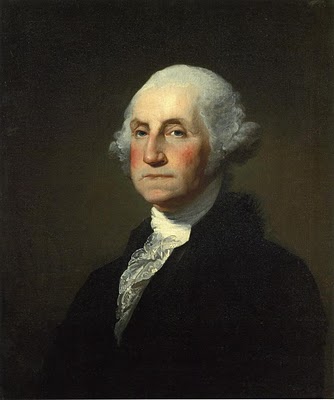I am currently reading the Pulitzer Prize winning historical work Washington: A Life by Ron Chernow (2010), given to me as a Father’s Day present by my son Phil and his wife Leah. Overall, I handily recommend it to readers interested in the details of the lives of the Founding Fathers of the United States. I find a lot of help in the details but at times I have some disagreements on certain points, not always minor. Let me list some of my observations:
- I have long held that George Washington was my favorite President based upon my studies (I started years ago with Irving’s work). Chernow’s work deepens this for me. I appreciate the presentation of both flaws and strengths. Yet, Chernow has a way with words that helps the reader to picture in full bloom the way that Washington was accepted as the great man of his times. Beyond that he adroitly shows why Washington deserved such credit in spite of his flaws.
- Washington’s greatest contribution may not have been the tone he set for the first presidency. It was probably, in my opinion, his holding together of a straggly bunch of ragamuffins known as the Continental Army. Their survival for over eight years was nothing short of the miraculous. Chernow does a better job than most of delving into the details of Washington’s attempts to get the States and Congress to help his army, usually with failure. Yet, somehow they managed to stay together and surprisingly win the Revolutionary War, albeit with French help as we all know.
- I found it astonishing (this is my greatest criticism of the book) that Chernow does not interact with nor include in his bibliography Peter Lillback’s work, George Washington’s Sacred Fire (2006). Lillback, President of Westminster Seminary, shows beyond doubt, in my judgment, that Washington was not a deist. Instead he was a thorough-going evangelical of the Anglican tradition. Lillback gave us over 1300 pages including massive appendices of original works for our study. While the opinions of Washington’s religiosity and morals (especially concerning the ladies) has been debated much since the 1930s (with our increasingly secular world seeing him more and more as a rascal of sorts), Chernow does not go that far. He admits, although it seems reluctantly, that Washington was probably not a womanizer although he enjoyed the presence of young ladies. Also, while Chernow does acknowledge Washington’s moral character and his Christian devotion, he overstates the worn out observations that Washington never took communion, etc., among other points – many such points easily refutable if Lillback’s research were taken into account.
- I think Chernow joins other works, and perhaps eclipses them in clarity of presentation, when it comes to Washington’s greatest sin – adherence to slavery. Chernow correctly deals with this off and on in the life of Washington because it was an issue that did not go away. While Washington gradually came to a position that slaves should be freed, he fought the idea for years with an ambivalent soul because he knew that the financial status of himself and his aristocratic friends of Virginia, among others, would be dumped out into economic turmoil if slaves were suddenly freed. This is the greatest sin of our Founders. They punted on the question of slavery, hoping against hope that it would take care of itself over time or that their children and grandchildren could solve the nasty dilemma it presented. As a result of their most prominent sin, our country ended up in Civil War. Interestingly, men who were filled with courage on so many levels and in so many ways could not muster the moral courage it took to deal with slavery and implement the Founding principles of their Declaration of Independence universally as they had stated it. One thing that we may learn from this is that the current financial crisis of our present time is not something we should punt down the road and expect our children and grandchildren to deal with. We must face our debts and deal with them. It will take moral courage, something that seems in short supply.

